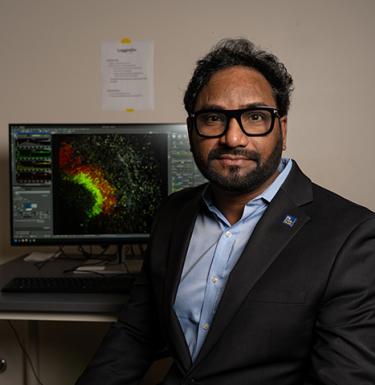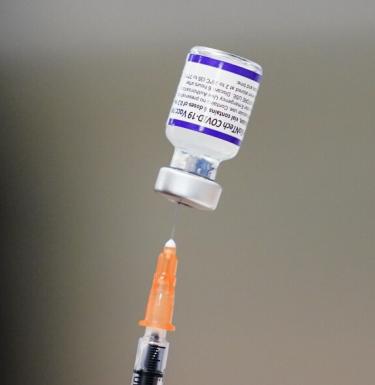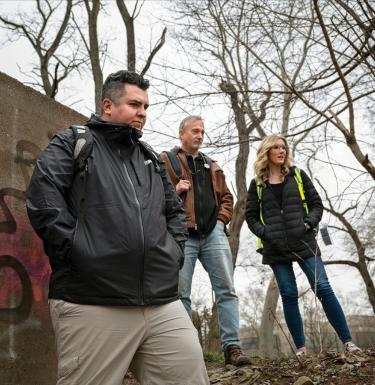
Anxiety diagnoses have overtaken Pennsylvania's medical cannabis program, study finds
"Adding anxiety to the [cannabis] program may inadvertently signal to patients that cannabis is effective for treating it, despite the lack of evidence, which is concerning,” Coleman Drake, associate professor of health policy and management, said in a statement.
In Good Health: Vaccines, menopause, and cardiovascular disease
Epidemiology's Samar El Khoudary discusses cardiovascular disease and the menopausal transition live on NPR's news magazine show 1A.
Dengue severity linked to genetic ancestry’s influence on immune response
Priscila Castanha, PhD, assistant professor of infectious diseases and microbiology, and colleagues have linked the extreme variability in severity of the mosquito-borne viral disease dengue to the influence of genetic ancestry on inflammatory responses in the skin.
Tiffany Gary-Webb channels Senegal trips into collaborative disease research
Dr. Gary-Webb's focus on African American populations in the U.S. has expanded to include the Caribbean, Jamaica and Dakar, Senegal, with recent travels and collaborations geared toward improving health outcomes for noncommunicable diseases.
Jewish Healthcare Foundation announces the Justin Reid Ehrenwerth Emerging Scholar Award
The Jewish Healthcare Foundation has awarded $15,000 to the School of Public Health to establish the Justin Reid Ehrenwerth Emerging Scholar Award. This award will support a high school student enrolled in the school's Public Health Science Academy.
Potential environmental effects of nuclear war report and webinar
Dean Maureen Lichtveld, a member of the National Academies' Committee on Independent Study on Potential Environmental Effects of Nuclear War, participated in a report and webinar on the Potential Environmental Effects of Nuclear War.
Dr. Felicia Hill-Briggs Health Equity Trailblazers in Diabetes Award debuts
Tiffany L. Gary-Webb, PhD, MHS, professor of epidemiology, received the inaugural Dr. Felicia Hill-Briggs Health Equity Trailblazers in Diabetes Award.
Recent heavy rains wreak havoc on Pittsburgh's river recreation
Beyond sewage, flooding can wash all sorts of chemicals into the water, said Maureen Lichtveld, dean of the school of public health at the University of Pittsburgh.
mRNA vaccine technology makes headway via Pitt, Penn State research
"This study demonstrated two key aspects," said Suresh Kuchipudi, senior author on the paper and chair of infectious diseases and microbiology, "that we can produce mRNA vaccines with much less mRNA required, that will significantly lower the cost of the vaccines."
They’re not your grandfather’s videogames. But your grandfathers are playing them.
“One of the things we’ve seen since the pandemic is people consuming more media, especially on their phones,” said Beth Hoffman, assistant professor of behavioral and community health sciences.
Research funding makes understanding diseases like Avian Flu possible
Professor and chair of Infectious Diseases and Microbiology, Suresh Kuchipudi, focuses on avian flu and other animal-borne viruses and how they affect humans and animals.
The next generation of mRNA vaccines could be cheaper and more effective, Pitt research finds
Suresh Kuchipudi, chair of infectious diseases and microbiology, said the goal of his team’s research is to generate the science that can eventually be used to develop a product or inform other health applications.
Microsoft’s Peter Lee cheers Pitt graduates, urges ethical, equitable AI
Microsoft research president, Dr. Peter Lee assured University of Pittsburgh School of Public Health graduates on May 2 that their generation is uniquely positioned to steer the world toward healthier, more equitable futures—and he pledged that trailblazers in medicine and technology stand firmly behind them.
Community perceptions of a petrochemical plant’s environmental footprint
Before the Shell ethane cracker plant in Beaver County, Pa., fired up its flares in November 2022, Associate Professor of Biostatistics and Health Data Science Jeanine Buchanich, PhD, and her team at the University of Pittsburgh were already listening.